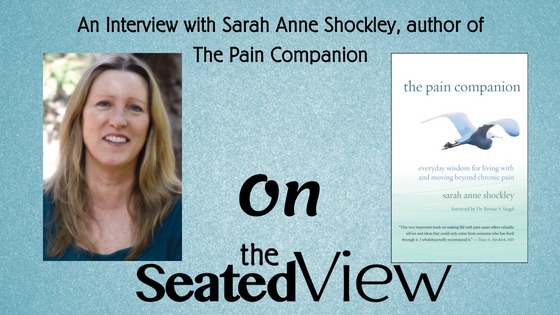Dealing with Pain in a Non-Medical Way: an Interview with Sarah Anne Shockley

Sarah Anne Shockley is the author of The Pain Companion: Everyday Wisdom for Living With and Moving Beyond Chronic Pain. It’s a wonderful book with lots of great tips that can help you deal with pain in a compassionate and gentle way. I had the opportunity to interview the author via email about her life with chronic pain and her book.
Please tell us your story.
In the fall of 2007, I contracted Thoracic Outlet Syndrome, a collapse of the area between the collarbone and first rib. This collapse squeezes the scalene muscle, nerve ganglia, artery and veins that have to fit through this narrow space, creating severe nerve pain in the neck, arms, and hands, which affects my ability to use my hands and arms. For quite a few years, I could barely function. My life basically stopped. I lost the ability to participate in just about everything I enjoyed. I was a single mom and struggled even to be able to cook a meal for my son. After about 5 years of being very stoic and putting up with the situation, I decided that I couldn’t live my life that way any more. That’s when I started developing the approaches I write about in The Pain Companion.
How is your book different from other books on pain?
The Pain Companion focuses primarily on the non-medical aspects of living with pain and pain relief. It offers companionship and solace, as well as many practical methods to reduce emotional, mental, and physical stress. Very unintentionally, books that promise a pain free result can make readers feel worse about themselves when the method doesn’t deliver on its promise. This leads to feelings of failure and shame. The Pain Companion does not require readers to end their pain, but walks along the path with them, offering simple ways to make life easier, to live with more grace, and to practice compassion toward the self while moving through and beyond the experience of pain.
The opioid crisis has led to restrictions on pain treatment, usually without offering meaningful alternatives to people living with chronic pain. How can The Pain Companion help?
With the current scare about the opioid addiction crisis, many are being taken off their pain meds and left to fend for themselves in terribly difficult circumstances. While I don’t offer readers solutions from a medical standpoint and I don’t promise to make anyone pain free, what I do offer is a positive, constructive approach to living with chronic pain and relieving the incredible stress, fear, and emotional distress that comes with that. I think it’s crucial that we understand how deeply long-term pain affects every aspect of a person’s life and begin to address it not just from a physical standpoint, but from emotional, mental, and spiritual levels as well.
In your book, you recommend writing letters to your pain. Why?
I recommend writing letters to pain in order to express and release our feelings about pain – the frustrations, anger, sadness, loss, guilt, and shame that we often feel when we’re living with pain. By recognizing, acknowledging, and expressing our emotional responses to pain, we can begin to let them go and find some emotional relief. Once we’ve expressed our negative feelings about pain, we’re free to consider other responses and can begin to create a more constructive relationship with it. Instead of fighting against it and resisting it as our primary response, we can begin to work with it as a messenger and an ally in healing.
Has your pain taught you anything?
Pain is a difficult mentor to have, but living with it has taught me a great deal. In learning how to shift my relationship with pain, I’ve learned how to shift my relationship with my body, and, ultimately, with myself. This includes learning to be kinder, more compassionate, softer, slower, and less stressed. I understand now that pain can be a guide and is the voice of the part of us that is trying to heal. Rather than attempting to completely silence it, I have learned to listen. I have learned that the way we often go about our lives – establishing and meeting goals, trying to excel, trying to be perfect, trying to be in control – is not necessarily the best way to approach healing.
What’s next for you?
I intend to continue writing and speaking with the hope of helping to shift our culture’s predominantly negative perception of pain and people in pain to one that is more constructive and healing. Pain is part of the human journey. We’re all going to meet it at some point, whether it’s physical or emotional. Living in pain is certainly a difficult and challenging experience, but one that we can learn from and move through with much more grace and well-being if we respond to it, and to ourselves, with more compassion, softness, and acceptance.
Thank you very much to Sarah for taking the time to do this interview and for writing this great book. I highly recommend it.
You can read more of a Sarah’s excellent writing on her website. The Pain Companion: Everyday Wisdom for Living With and Moving Beyond Chronic Pain Is available on Amazon and other sites and stores.
1 Comment
Read More
Discover what else I've been writing about...
















I wrote my pain. it wort back,
Return t o sender, that address unknown, no such number, tell that fool I aint home.
Really the worst thing about pain is isolation. The book at least lets us know that pain is a universal experience.